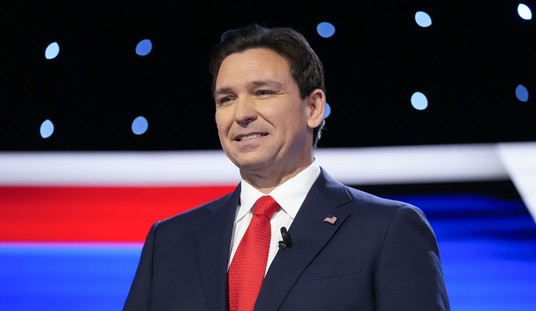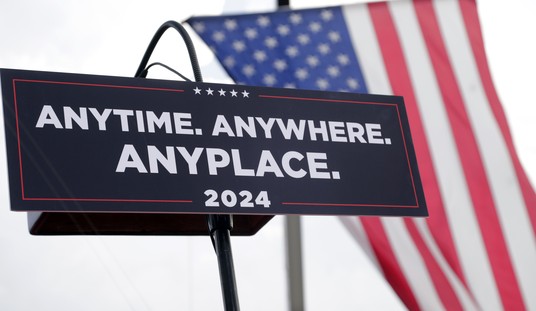You already know the background here, I hope. If not, read this post and/or this post to catch up. The ObamaCare statute says that federal subsidies to help people pay for their new O-Care health insurance are available to anyone who buys their plan from “an Exchange established by the State.” Thirty-six states declined to build their own exchanges, though, so the White House built a big federal exchange for them instead. That’s Healthcare.gov. Question: If you buy a plan from Healthcare.gov, does that qualify as buying from “an Exchange established by the State”? Or are subsidies reserved exclusively for exchanges built by the individual states, not the feds?
The financial impact of ObamaCare for five million people hangs on six words. Held by the D.C. Circuit: Subsidies apply only to true state exchanges, not Healthcare.gov.

Plain and simple, if Congress wants to rewrite the law to extend subsidies to federal enrollees, they’re welcome to do it. That’s what legislatures are for. But the law, as written, says what it says, and that’s not the court’s problem.
I want to get this thread up quickly so people can comment, but lots of updates are coming. Stand by.
Update: Another report estimates that 7.3 million people will be affected by 2016 if this stands, to the tune of $36 billion.
Update: Will it stand, though? Good point on procedural next steps here:
https://twitter.com/sahilkapur/status/491592918030090240
Federal appeals courts typically assign three judges to hear a case. This one came out 2-1. The losing party can petition, though, for an “en banc” hearing, in which all judges on the circuit re-hear the case together and issue a new opinion affirming or reversing the previous one. Kapur’s point is that ramming through a few Obama appointees means this case has a better chance than it otherwise would have of being reversed en banc.
After the en banc hearing, there’s only one place left to go. And since the D.C. Circuit is widely regarded as the most influential circuit, odds are that the final step will be taken. You ready for round two on ObamaCare, John Roberts?
Update: Yep.
https://twitter.com/KevinWGlass/status/491590413388873728
As Pelosi once famously said, they had to pass the law to find out what’s in it. Now they know.
Update: Another post you should read today if you haven’t already is Ed’s take yesterday on HHS deciding that federal territories aren’t eligible for ObamaCare under the statute. They read the word “state” narrowly in arriving at that conclusion — the opposite of their very broad reading of “state” to include the federal exchange in today’s case. What will the D.C. Circuit do with that en banc, Ed wonders.
Update: Needless to say, the reluctance the court’s feeling in the above excerpt derives from knowing there’s no way Congress will come together to clarify the law. If Democrats controlled the House and Obama still had a filibuster-proof majority in the Senate, this ruling would be a yawn. Congress would pass a one-sentence bill — “for purposes of this law, an exchange established by the federal government on behalf of a State shall qualify as ‘an exchange established by the State'” — and that would be that. As it is, congressional gridlock ensures that this won’t be fixed at the federal level.
But what about at the state level? There’s a not-so-easy fix for consumers in states that just had their subsidies voided: Their governor and state legislature could get together and create a true state exchange, which would of course be eligible for subsidies. That’s going to put a lot of pressure on Republican governors who opposed creating a state exchange in the first place, especially ones facing reelection this year. Right, Scott Walker?
Update: Heh.
I love that the argument for Obamacare in Halbig is to ever more strenuously repeat "the intent of the framers!"
— PoliMath (@politicalmath) July 22, 2014
Update: The White House is already getting ready for en banc review:
Obama Adm official on Halbig: "The Department of Justice can, and will, seek en banc review by the full D.C. Circuit"
— Sam Stein (@samstein) July 22, 2014
Why do that instead of petitioning the Supreme Court to hear the case right now? Because, I guess, there’s a chance (although a thin one at this point, I’d imagine) that the Supremes wouldn’t take the case, which would mean the lower-court ruling would stand — and right now, the lower court is very much against the White House. If they win on en banc and then the Supremes decline to hear it, that en banc ruling would stand instead.
Update: Yeah, Democrats are all about outsourcing congressional powers these days.
It's hardly surprising, though, to see Democrats who welcomed Obama's decision to seize legislative powers urge the courts to do the same.
— Gabriel Malor (@gabrielmalor) July 22, 2014
Update: Aha. Now that I have a minute to skim through the D.C. Circuit’s opinion, I see that the issue Ed raised is already on the legal radar. From page 37, here’s the majority answering the argument that federal exchange customers should be eligible for subsidies because the whole point of the Affordable Care Act is to make coverage universal and more affordable for everyone. Not quite everyone, says the court:


Obviously the feds were willing to withhold “affordable care” from some U.S. citizens, in which case, what’s to say they didn’t also mean to withhold them from federal exchange customers? The plaintiffs claim that Congress wanted to give each state a strong incentive to build its own exchange so that the federal government wouldn’t have to do it for them. That’s where the subsidies come in, allegedly. If you build your own state exchange, your residents get subsidies. If you don’t, they don’t. The fact that the feds drew a line for “affordable cart” at the territories suggests that there may have been other lines they intended to draw. It’s ambiguous, but when in doubt, says the court, you default to what the plain text says.
Update: Guy Benson e-mails with a link to this piece by Michael Cannon, who spearheaded today’s lawsuit, arguing that this also means the individual mandate penalty no longer applies in the 36 states covered by the federal exchange.
In a Cato Institute study released last year, I estimated the number of previously uninsured individuals in each state who would be exempt from the individual-mandate tax if their state declined to establish an Exchange. In the 36 states that did not establish Exchanges, those figures provide a conservative estimate of the number of residents the IRS is unlawfully subjecting to that tax simply by issuing subsidies through federal Exchanges.
Table 1 shows that in the 36 states with federal Exchanges, a victory for the Halbig plaintiffs would free more than 8.3 million residents from being subject to those unlawful taxes. (The correct word is “free,” not “exempt.” By law, these individuals are already exempt, because their state’s decision not to establish an Exchange exempts them. The ruling would free them from being subjected to that tax anyway.) Such a ruling would free nearly 1 million Floridians and more than 1.5 million Texans from the individual-mandate tax. In 2016, it would free families of four earning as little as $24,000 per year from an illegal tax of $2,085.
The penalty, like the subsidies, applies to people who live in a state with “an exchange established by the State.” Per the D.C. Circuit, that phrase no longer includes the federal exchange. Then again, pretty much everyone is now exempt from the individual mandate if they really, really want to be, right?








Join the conversation as a VIP Member